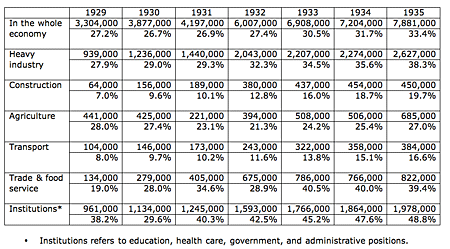Europe
Napoleon as an Ambitious Young General in 1796–97
In his memoirs, André François Miot de Melito, a special minister from the French government to Piedmont, tells of his first impressions of the young Napoleon Bonaparte, who was only twenty-seven but already an important general because of his victories in the Italian campaign.
Kersaint, "Discussion of Troubles in the Colonies" (28 March 1792)
This speech by a former noble who had served as a naval officer reveals the deep ambivalence of the deputies about moving too quickly to emancipate the slaves.
Women and Stalinism: Newspaper, Women Workers
The increased presence of women in the workforce as a result of industrialization and other aspects of modernization during the 1930s was documented in government publications.
Women and Stalinism: Newspaper, Women’s Work
The increased presence of women in the workforce as a result of industrialization and other aspects of modernization during the 1930s was documented in government publications.

Women and Stalinism: Quantitative Evidence, Women's Education
The increased presence of women in the workforce as a result of industrialization and other aspects of modernization during the 1930s was documented in government publications.

Women and Stalinism: Quantitative Evidence, Women's Employment
The increased presence of women in the workforce as a result of industrialization and other aspects of modernization during the 1930s was documented in government publications.
Women and Stalinism: Newspaper, Women’s Roles
Articles and images published in Soviet newspapers on March 8, International Communist Woman’s Day, provide the most obvious examples of how women were used as symbols in a propaganda campaign.
Women and Stalinism: Newspaper, Women's Equality
Articles and images published in Soviet newspapers on March 8, International Communist Woman’s Day, provide the most obvious examples of how women were used as symbols in a propaganda campaign.
Barnave, "Speech for the Colonial Committee of the National Assembly" (8 March 1790)
Here Antoine–Pierre Barnave, a well–connected and influential lawyer from Grenoble, represented those interests that wanted to hold onto France’s rich colonial possessions.
Letter from Monseron de l’Aunay to the Marquis de Condorcet, President of the Society of Friends of the Blacks (24 December 1789)
This letter appears in the Journal of Paris as part of a debate over a performance of a play by Olympe de Gouges, the noted feminist, that concerns the abolition of the slave trade.